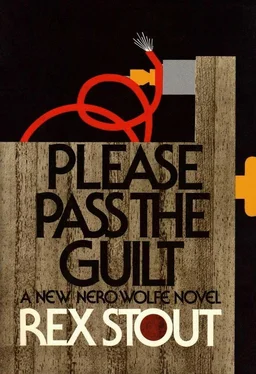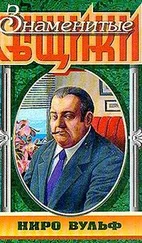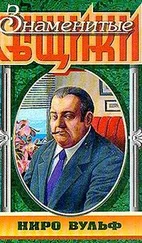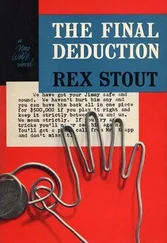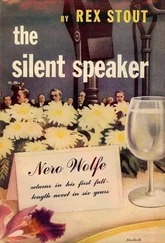“Mr. Rowcliff and his wife?”
“Three people say they’re happy. I know it’s hard to believe that anybody could stand Rowcliff, but off duty he may be different.”
“Have you caused a stir?”
“No.”
That was Saul. Not “I hope not” or “I don’t think so.” Just “No.”
“More than satisfactory.” Wolfe took the smock off and hung it on a wall hook, got his vest and jacket from a hanger, and put them on. He looked at the clock on the bench: two minutes to eleven. “I want a word with Theodore and I’ll consider this on the way down. Put a bottle of champagne in the refrigerator, Archie — and Saul, we’ll probably need you.”
Saul and I went.
I suppose I shouldn’t include what happened next; it’s just too pat. Who will believe it? But Fred deserves to have it in, and it happened. Saul and I had just got to the office, having stopped at the kitchen on the way, and were discussing how it should be handled, when the doorbell rang and I went. It was Fred. I opened the door, and as he entered he blurted, “Is he down yet?” I said he was on the way and he said, “If I hold it in any longer I’ll bust. Copes’s twin sister is married to that sonofabitch Rowcliff.”
All right, it happened. In nineteen days they had got exactly nothing, and here came two of them, practically simultaneous, with the same beautiful slab of bacon. Saul, who had come to the hall and heard him, said, “So we need two bottles of champagne,” and went to the kitchen. I was telling Fred that Saul had beat him by just sixteen minutes, when the elevator door opened and Wolfe was there, and when he saw the look on Fred’s face, he knew what had happened, so I didn’t have to tell him, but I did. He led the way to the office, and Saul came and he and Fred moved yellow chairs up.
Wolfe sat and said, “Get Mr. Cramer.”
He has been known to rush it, and it had been a long dry spell. “You once made a remark,” I said, “about impetuosity. I could quote it verbatim.”
“So could I. If we discussed it all day there would still be only one way to learn if we have it or not. Get him.”
“If he’s not there do you want Rowcliff?”
“No. Only Mr. Cramer.”
I pulled the phone around and dialed, and got first the switchboard, then a sergeant I knew only by name, Molloy, and then Inspector Cramer, and Wolfe took his phone. I stayed on.
Wolfe: “Good morning.”
“Is it?”
“I think so. I have a problem. I must discuss a matter with Mr. Rowcliff as soon as possible, and it will go better if you are present. It relates to the death of Peter Odell. Could you come now?”
“No. I’ll get Rowcliff on another phone.”
“That wouldn’t do. I have a tape recording both of you should hear.”
“A recording of what?”
“You’ll know when you hear it. You won’t like it, but it may give you a useful hint. It has given me one.”
“I can’t — wait. Maybe I can. Hold it.”
We held it for about two minutes, and then: “Does it have to be Rowcliff?”
“Yes. That’s requisite.”
“I never expected to hear this, you wanting to see Rowcliff. We’ll leave in about ten minutes.”
Click.
We hung up. I asked Wolfe, “The Copes tape?”
He said yes, and I went to the safe for the key to the locked cabinet where we keep various items that would be in the safe if there was room. Wolfe started in on Saul and Fred, asking questions that I thought should have been asked before calling Cramer, but he got nothing that tangled it. Fred had nothing but the bare fact that Copes’s sister was Rowcliff’s wife. Saul, knowing we would need more, had proceeded to get it, but he hadn’t seen Diana herself, only neighbors and a woman who cleaned the Rowcliff apartment once a week, and two men who knew Copes. Almost certainly nothing had got to Rowcliff. However, one problem arose that had to be dealt with; Wolfe rang for beer and had the cap off of the bottle before he remembered that we were probably going to open champagne. He called Fritz in for consultation, and they decided it would be interesting to try eel stewed in stale beer, and Fritz thought he knew where he could get eel the next day. Wolfe told him Saul and Fred would join us for lunch, and it should be a little early if possible — one o’clock.
Lieutenant Rowcliff has it in for all private detectives, but I admit he has a special reason for thinking the world would be better off without me. When he gets hot he stutters, and with me it must be catching, because when he’s working on me and I see that he is getting close to that point, I start to stutter, especially on words that begin with g or t . It’s a misdemeanor to interfere with a police officer in the performance of his duty, but how could he handle that? Wolfe knows about it, and when the doorbell rang at a quarter to twelve and he told Saul to get it, I believe he actually thought I might greet them with “Gu-gu-gu-good morning.”
I was at my desk. Fred was in one of the three yellow chairs facing Wolfe’s desk, the one nearest me. Cramer, leading the way, of course went to the red leather chair, and Rowcliff took the yellow one nearest him, which left the middle one for Saul. As Cramer sat, he said, “Make it snappy. Rowcliff has someone waiting. What’s this about a recording?”
“I’ll have to introduce it,” Wolfe said. “You probably know the name, Dennis Copes.”
“I’ve heard it. One of the CAN bunch.”
“I know him,” Rowcliff said. “He wants Meer’s job.”
Wolfe nodded. “So it is said. As you know, Mrs. Odell’s advertisement appeared last Tuesday, six days ago. Mr. Copes came here Thursday evening and said he had to admit something and that he had information to give me under the conditions stated in the advertisement. He did so. The recording is that conversation. — Archie?”
All I had to do was reach to the far corner of my desk to flip a switch. The playback, which was a honey and had cost $922.50, was on the desk at the back. We knew it was a good tape, since we had listened to it three times.
Copes’s voice came. “That was a good ad. ‘Any person who communicates as a result of this advertisement thereby agrees to the above conditions.’ Very neat. What agency?”
“Agency?”
“Who wrote it?”
“Mr. Goodwin.”
Naturally I watched their faces. The first few minutes they looked at each other a couple of times, but then their eyes stayed mostly on Wolfe. Then Cramer set his jaw and his face got even redder than usual, and Rowcliff started to lick his lips. It has been said that Rowcliff is handsome, and I’ll concede that his six feet of meat is distributed well enough, but his face reminds me of a camel with a built-in sneer. All right, I don’t like him, so allow for it. Of course licking his lips didn’t improve it any.
It got to the end. Wolfe: “You may have to. I can’t tell you how I’ll proceed, Mr. Copes, because I don’t know. If I need you, I’ll know where to find you.” I reached to the switch and flipped it.
“By god,” Cramer said. He was so mad his voice was weak. “Four days ago. Four whole days. And you even told him not to tell anybody anything. And now you get us here and — How in hell you expect—”
“Pfui,” Wolfe said. “You’re not a witling and you know I’m not. If I had believed he was telling the truth, I might or might not have informed you immediately, but I certainly would not have risked telling him not to. I had good reason to suspect that he wasn’t. How could Kenneth Meer possibly have known that Odell intended to put LSD in the whisky? I don’t know how much of an effort you have made to learn if anyone knew, and if so who, but I know how much I have. I thought it extremely doubtful that Meer could have known. But if he didn’t, if Copes was lying, how did Copes know even now? Apparently it had been kept an official secret; it had not been disclosed by you or the District Attorney. And I had to know. I had to know if Copes could possibly have learned about the LSD from any other source. Unless such a source could be found, it would be impossible to challenge his account, and I would have to advise him to tell you without further delay. At ten o’clock Friday morning, five of us gathered here to consider it, and Mr. Panzer, Mr. Durkin, and Mr. Cather were given instructions and proceeded to inquire. The obvious possibil—”
Читать дальше
